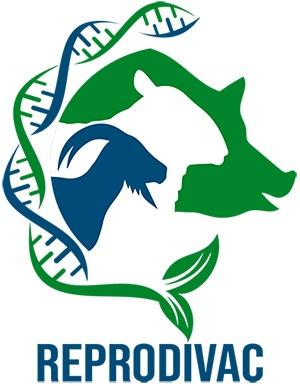REPRODIVAC - Next-generation vaccines and diagnostics to prevent livestock reproductive diseases of worldwide impact
Group leaders
Institution | Leader |
|---|---|
ENEA | More than 30 years of research experience in the field of immunology and biotechnology. Main research interests: T lymphocytes differentiation and function, Expression of recombinant proteins in heterologous hosts, Plant virology, Vaccinology, Molecular farming (production of biopharmaceuticals in plants), Nanoparticles, Strategies for drug and vaccine delivery, Development of diagnostic assays, OneHealth (https://bioagro.sostenibilita.enea.it/people/selene-baschieri) |
WUR | Marielle is a molecular microbiologist with expertise in bacterial genetics and physiology. In 2018, she completed her PhD on genetic regulation of the bacterial cell envelope at the University of Groningen. After that, Marielle joined WBVR as a research scientist and project leader. Here, she studies intracellular bacterial infections, with a focus on brucellosis and Q-fever. Her goal is to advance understanding of bacterial virulence and host-pathogen interactions and apply this knowledge to address challenges in the veterinary field, including the improvement of diagnostics. Main research topics include epigenetic regulation of bacterial virulence, extracellular RNA and vesicles and infection dynamics in in vitro and ex-vivo systems. |
UDL | Is associate professor at the Department of Animal Science in the University of Lleida (UdL) and a Senior Researcher at the Agrotecnio Research Center since 2010. From 1997 to 2004, he works as swine veterinarian for a big integration company in Spain and, from 2004 to 2010, as senior researcher at CReSA, Barcelona, Spain mainly developing and testing new drugs and vaccines for pigs. His research interest includes epidemiology, pharmacology and immunology focused on developing new tools to control bacterial and viral diseases in livestock. He is member of the European College of Porcine Health and Management and European expert to evaluate drugs and vaccines for animals in the European Union. He has published 126 papers in peer-review journals. |
CEP | He is a specialist in Pig Production and a Researcher in the Department of Animal Science of the University of Lleida and the Agrotecnio Center with participation in several national and international research projects. He also Works as international Scientific director of the Centro de Estudios Porcinos (CEP) de Catalunya (2007-present). His research activity is focused on the evaluation of the technical and economic efficiency of the pig production system and the evaluation of farm strategies to reduce environmental impact. He has participated in 42 and 68 competitive and non-competitive projects, respectively during his career. His research activity can be consulted in the following link:
|
CEVA | |
FLI | Prof. Menge has particular expertise in the analysis of bacterial host-interactions at the intestinal mucosal surface of livestock. Using in vitro culture systems for primary intestinal epithelial cells, macrophages, and intraepithelial lymphocytes, and experimental infection studies in the target species his group elucidated the mechanisms by which enterohaemorrhagic Escherichia coli (EHEC) manipulates its host´s immune system. He also has substantial expertise in clinical immunology and the immunobiology of other bacterial pathogens, e.g., tuberculous and non-tuberculous Mycobacteria and Coxiella, viruses and parasites in large and companion animal species. He possesses broad knowledge and expertise in surveillance, diagnosis, control and eradication of epizootic diseases in accordance with rules laid down in national and international animal health legislation. |
CITA | PhD in Veterinary Medicine (University of Zaragoza 2005), has been working on animal brucellosis research for over 20 years and is specialized in development of brucellosis vaccines, animal models, diagnostic techniques, epidemiology and control and eradication strategies. Currently, she is the head of brucellosis research line at the Animal Science Department of CITA and collaborator with the Government of Aragon (Spain) in official brucellosis eradication campaings and wildlife surveillance programs. She has participated in 15 research projects on brucellosis (acting as coordinator or principal researcher in 4 of them), including 3 European Union funded projects. She is author or co-author of 2 Book Chapters, 50 research articles and more than 40 contributions to research conferences on this topic. She has been consultor and trainer on brucellosis diagnostics, epidemiology and control for the Swiss Agency for Development and Cooperation, Executive Agency for Health and Consumers (EAHC) and AGROTEC (EuropeAid). https://orcid.org/0000-0002-7970-4929. |
UON | (October, 25th, 1980, Spain); Ph.D. (with Honors), 2008, University of Navarra; Postdoctoral Fellow, 2009-2011, Biozentrum-University of Basel [Switzerland]; Current position, Professor [Profesor Titular], University of Navarra). Her research has been dedicated to Brucella and brucellosis (mechanisms of virulence, cellular microbiology, vaccine development and diagnosis). She is co-principal investigator of the Brucellosis group of the ISTUN (Institute of Tropical Health University of Navarra) group that, in addition to participating in brucellosis diagnostic projects, collaborates in Brucellosis training in Africa (https://www.unav.edu/web/instituto-de-salud-tropical). She is the author/co-author of 2 Book Chapters, more than 50 Research Articles in Science Citation Index international journals and 60 contributions to research conferences. R. Conde-Alvarez has participated in more than 15 projects, including EU funded projects. Her research has led to two patents, collaborations with companies (EUROFINS-INGENASA and AQUILON) as well as to the participation of the scientific group in two consortia (Cooper Zeltia Vaccines-Centro de Investigación en Tecnología Agroalimentaria de Zaragoza-Universidad de Navarra, and Virbac-Centre d'Immunologie de Marseille-Luminy-Universidad de Navarra) each one recently awarded a first phase prize in the GALVMed competition (Development of a new vaccine against animal brucellosis). She combines the research activity with academic activities, teaching in the degrees of Pharmacy and Nutrition, Biology and Biochemistry of the University of Navarra and in the Master's Degree in Drug Research and Development (UNAV). She has directed or co-directed 8 Final Degree Projects, 5 Master Final Projects and 3 Theses (Cum Laude). She currently directs or co-directs 3 Ph.D. Theses. |
UMU | Associate Professor in the Department of Animal Health and Head of the Microbial Pathogenesis Research Group at the University of Murcia. Since 1998, she has focused on elucidating the immunopathogenic mechanisms of Chlamydia abortus. She has participated in more than 30 research projects and industry contracts, working with multidisciplinary teams in academic and research institutions worldwide. Her research centers on immunological mechanisms, the development and evaluation of new vaccines against chlamydial abortion, and the diagnosis and epidemiology of diseases in domestic animals and wildlife. https://orcid.org/0000-0003-4719-8926
She is a Member of the Panel of Experts on Ovine Chlamydiosis within the DISCONTOOLS European Knowledge Project, contributing to the identification of research gaps and priorities for disease control (discontools.eu) and Founding member and current Secretary of the European Society for Animal Chlamydiosis and Zoonoses (www.um.es/esacz).
|
EPFL | Throughout my PhD and postdoctoral studies I was trained in the United States of America (University of Washington and The Scripps Research Institute). My PhD studies evolved in the direction of immunogen design and vaccine engineering. During my postdoctoral studies I joined a chemical biology laboratory at the Scripps Research Institute, developing novel chemoproteomics methods for the identification of protein-small molecule interaction sites in complex proteomes. In 2015, I joined EPFL as a tenure track assistant professor. The focus of my research group is to develop computational tools for protein design with particular emphasis in applying these strategies to immunoengineering (e.g. vaccine and cancer immunotherapy). Current work
|
GSP | |
CZV | |
TPI |
Leads Pirbright's Porcine Reproductive and Respiratory Syndrome Immunology Group. The overarching aim of the group is to improve our understanding of the interactions between porcine reproductive and respiratory syndrome viruses (PRRSV) and the immune system and to exploit this to develop next-generation vaccines (https://www.pirbright.ac.uk/our-science/porcine-reproductive-and-respiratory-syndrome-prrs-immunology). |
MRI | Since 1997, David has led Chlamydia research at Moredun, investigating the pathogenesis and control of chlamydial infections in ruminants including developing tools for improved diagnosis and developing improved vaccines.
e-mail: - more details |
Dr Tom McNeilly, a qualified veterinary surgeon, is an immunologist and infectious disease biologist with expertise in translational aspects of ruminant immunology, including vaccine development and population-based studies on immune variation in livestock species. He has been involved in the development vaccines to control parasitic, viral and bacterial infections in both cattle and sheep, including those which have progressed to field evaluation. His work has used advanced surgical and culture-based methods in ruminant species to define key host-pathogen interactions at the mucosal interface, and has identified several heritable immune biomarkers in ruminants associated with increased resistance to disease. He has published over 100 refereed publications in international peer-reviewed journals. His current interests are: 1. The use of in vivo and in vitro study systems to understand host-pathogen interactions at mucosal surfaces; 2. The development of vaccines against major endemic pathogens of sheep and cattle, including gastro-intestinal parasites and the ruminant Hazard Group 3 pathogens Coxiella burnetii and Shiga-toxin producing Escherichia coli (STEC); 3. The epidemiology of these pathogens in terms of optimal vaccine deployment and/or assessment of zoonotic risk; 4. The causes and consequences of immune variation in in ruminant populations including trade-offs between productivity and immune function. e-mail: - more detail | |
Dr Holly Hill is an Early Career Researcher specialising in veterinary microbiology, immunity, and infection, with a strong background in diagnostics, disease surveillance, and vaccine research. Her work focuses on improving the detection and control of infectious reproductive diseases of livestock, drawing on experience in reference laboratory and accredited testing environments. Within REPRODIVAC, she leads Work Package 4, delivering point-of-care and DIVA-compatible diagnostics to support robust disease detection and surveillance. | |
ENSL | The main focus of my research is the analysis of virus architecture and dynamics of infection processes, employing cryo electron tomography and subtomogram averaging, fluorescence microscopy as well as standard molecular biology techniques. |
UOX | Matt is the EP Abraham Chair of Structural Biology at the University of Oxford. His research group specialise in understand host-parasite interactions at a structural and molecular level and using these insights to guide vaccine design. site: higginslab.web.ox.ac.uk |
REPRODIVAC has received funding from the European Union’s Horizon Europe research and innovation programme under Grant Agreement No. 101060813. Views and opinions expressed are however those of the author(s) only and do not necessarily reflect those of the European Union or other granting authorities. Neither the European Union nor the other granting authorities can be held responsible for them.

REPRODIVAC has received funding from the European Union’s Horizon Europe research and innovation programme under Grant Agreement No. 101060813. Views and opinions expressed are however those of the author(s) only and do not necessarily reflect those of the European Union or other granting authorities. Neither the European Union nor the other granting authorities can be held responsible for them.

